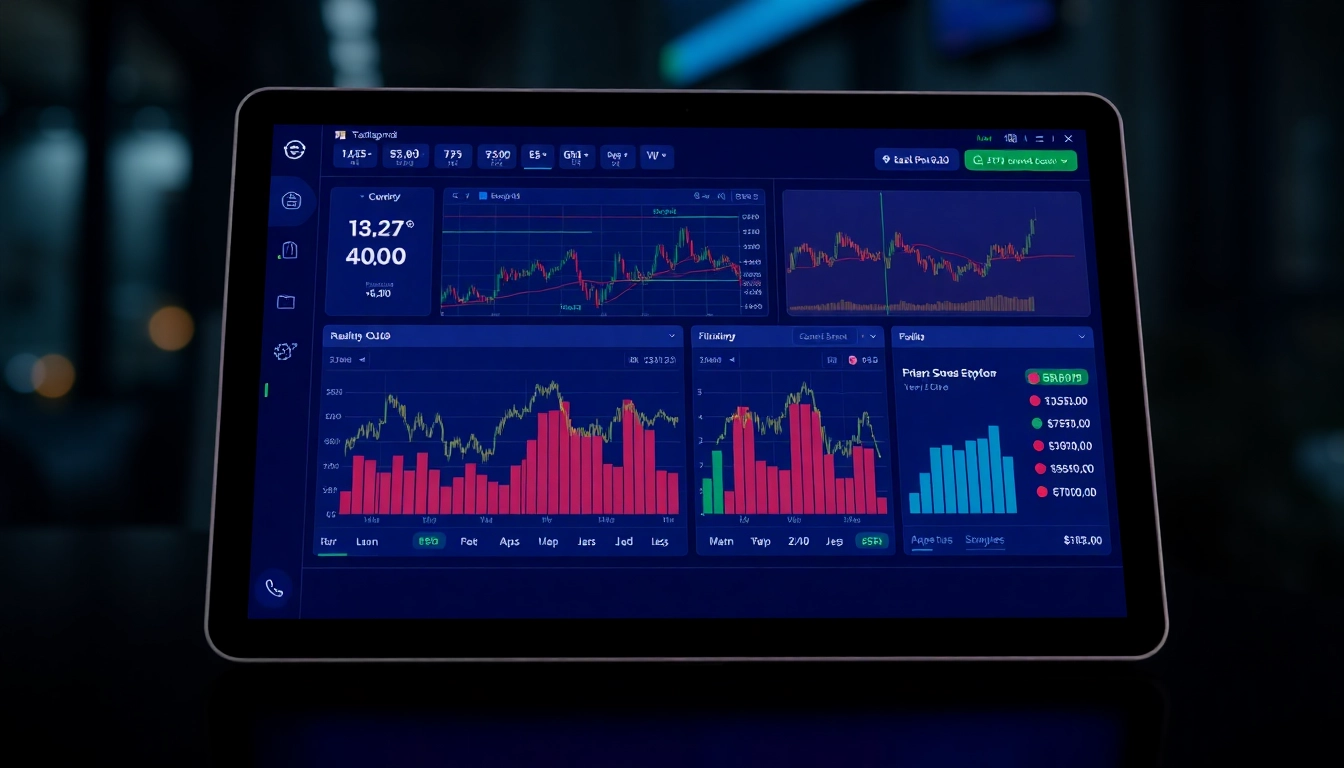Understanding the Fundamentals of Online Stock Trading in the UK
In recent years, the landscape of investing has transformed dramatically, driven by technological advances and increased accessibility. Online stock trading in the UK has become a popular avenue for both novice investors and seasoned traders to build wealth, manage portfolios, and participate in global markets. Unlike traditional investment methods that often involve cumbersome processes and high commissions, online trading platforms offer a streamlined, transparent, and cost-efficient way to access financial markets from the comfort of your home or on the go.
At the core of successful trading lies a clear understanding of what online stock trading entails. Essentially, it involves buying and selling shares of publicly-listed companies through digital platforms known as trading platforms or brokers. These platforms serve as intermediaries, executing your orders in real-time, providing market data, analysis tools, and account management features. To understand how to leverage these platforms effectively, it is crucial to recognize the regulatory environment, the importance of selecting the right platform, and the essential steps to get started.
For those venturing into the UK trading scene, visiting a resource like Online Stock Trading UK can provide comprehensive guidance on navigating the market, choosing platforms, and formulating strategies that align with their financial goals.
1.1 What is Online Stock Trading and How Does It Work?
Online stock trading involves placing buy or sell orders for stocks via an online platform rather than through traditional brokers or direct market access. Modern platforms connect investors directly to stock exchanges such as the London Stock Exchange (LSE) or international markets like New York or European exchanges. Users can access live price feeds, historical data, research reports, and advanced order types like limit, stop-loss, or trailing stops. Transactions are processed almost instantaneously, offering traders the flexibility to react swiftly to market movements.
For example, a trader monitoring the UK tech sector might notice a price dip and decide to execute a limit order to buy shares at a preferred price. Once the market hits this price point, the order executes automatically, provided the trader has sufficient funds in their account. This automation, combined with real-time data, empowers traders to optimize timing and strategies without needing to be glued to their screens constantly.
1.2 Key Regulations and Compliance for UK Traders
Participating in online stock trading in the UK requires adherence to strict regulatory standards designed to protect investors and ensure market integrity. The Financial Conduct Authority (FCA) is the primary regulator overseeing UK trading platforms, ensuring they operate transparently, maintain sufficient capital, and follow best practices for investor protection. More specifically, key regulations include:
- Client Money Rules — Protecting clients’ funds and ensuring segregation from firm assets.
- MiFID II Compliance — Facilitating transparency, investor protection, and market stability across European markets.
- Risk Disclosure and Suitability Assessments — Ensuring traders understand the products they invest in and that they are appropriate for their risk profile.
When choosing a trading platform, it is essential to verify FCA authorization. Licensed platforms must adhere to these regulations, offering a layer of safety, transparent pricing, and dispute resolution mechanisms, which are invaluable for avoiding scams or unfair practices.
1.3 Setting Up Your Account and Choosing Your Platform
Getting started with online stock trading involves a few key steps: selecting the right platform, opening an account, verifying your identity, and funding your account. The process has been simplified significantly in the UK, with most platforms allowing online registration within minutes. Necessary documentation typically includes proof of identity (passport or driver’s license), proof of address, and sometimes financial information for risk assessment.
Platforms cater to different needs — whether you prefer a simple interface for investing small amounts or a robust toolkit for active trading. Popular choices include Interactive Brokers, Trading 212, Freetrade, and Lloyds Bank’s share dealing services, each offering unique features. It’s crucial to compare aspects like trading fees, available markets, research tools, and mobile app capabilities to select the best fit.
Choosing the Best Online Stock Trading Platform in the UK
2.1 Features to Consider: Fees, Tools, and Accessibility
When evaluating trading platforms, several critical features should influence your decision:
- Commission and Fees: Lower trading commissions help maximize returns, especially for frequent traders. Platforms like Freetrade and Trading 212 offer commission-free trades, while others charge per transaction.
- Trading Tools & Research: Advanced charting, technical analysis indicators, real-time news, and market research are essential for developing effective strategies.
- User Interface & Accessibility: A user-friendly interface, intuitive navigation, and mobile compatibility ensure you can trade confidently from any device.
- Order Types & Execution Speed: Diverse order types and high execution speed reduce slippage and enable strategic flexibility.
- Account Security & Regulation: Confirm FCA registration and robust security measures like two-factor authentication.
2.2 Comparing Top UK Trading Platforms for Different Needs
Different traders have varying priorities. For beginners, platforms like Trading 212 and Freetrade provide simple interfaces, educational resources, and zero commissions. For active traders or professionals, Interactive Brokers offers extensive markets, advanced tools, and competitive spreads, making it ideal for those seeking comprehensive features.
Ultimately, your choice should align with your trading style, investment goals, and experience level. For instance, if you aim for long-term investing, platforms with lower fees and good research support are preferable. Meanwhile, day traders benefit from high-speed execution and advanced order types.
2.3 How to Open and Verify Your Trading Account Today
The registration process is straightforward and designed for quick onboarding. Typically, you will need to submit personal identification, proof of address, and answer questions about your financial situation and investment experience. Once approved, you can fund your account via bank transfer, debit/credit card, or other methods, depending on the platform.
After funding, most platforms offer demo accounts — a risk-free environment to practice trading using virtual funds. This aids in understanding platform features and testing strategies prior to committing real capital.
Developing Effective Trading Strategies in the UK Market
3.1 Fundamental and Technical Analysis Techniques
Successful traders leverage both fundamental and technical analysis to inform their decisions:
Fundamental Analysis
This involves evaluating a company’s financial health, growth prospects, and macroeconomic factors. Key metrics include earnings reports, revenue growth, debt levels, and industry trends. For UK companies, monitoring economic indicators like GDP growth, inflation, and Brexit-related factors can also influence stock performance.
Technical Analysis
This focuses on price patterns, volume, and market sentiment. Using charts and indicators such as Moving Averages, RSI, and MACD, traders identify entry and exit points. Combining both approaches offers a comprehensive view, enabling traders to refine their strategies and adapt to market conditions.
3.2 Risk Management and Diversification Tips
Controlling risk is paramount. Techniques include setting stop-loss orders, limiting position sizes, and diversifying across sectors and asset classes. Diversification reduces exposure to single-stock volatility and enhances portfolio stability over time.
3.3 Leveraging Market News and Data for Better Decisions
Staying informed is crucial in a dynamic market. Reliable sources include financial news outlets, economic calendars, and platform-integrated news feeds. Timely information helps traders capitalize on catalysts such as earnings releases, geopolitical developments, or regulatory changes, especially within the UK economic landscape.
Best Practices for Sustained Success in UK Online Stock Trading
4.1 Building a Consistent Trading Routine
Establishing a disciplined approach helps mitigate impulsivity. This includes defining daily routines, setting trading goals, and sticking to predetermined strategies. Regular review and adjustment based on performance are vital for continuous improvement.
4.2 Using Demo Accounts to Practice and Hone Skills
Demo accounts allow traders to experiment with new strategies, learn platform features, and develop confidence without risking real money. Regular practice builds familiarity and sharpens decision-making skills.
4.3 Avoiding Common Pitfalls and Emotional Trading
Psychological discipline is critical. Common pitfalls include overtrading, revenge trading, or falling for market hype. Maintaining emotional control through routines and realistic expectations fosters long-term success. Tools such as trading journals and mental resilience techniques help manage psychological challenges.
Measuring and Improving Your Trading Performance
5.1 Tracking Trades and Outcomes Effectively
Utilize trading journals or platform analytics to monitor entries, exits, profit/loss, and decision rationale. This data reveals patterns, strengths, and weaknesses in your approach.
5.2 Analyzing Data to Refine Strategies
Regular analysis involves reviewing trade performance, identifying consistent errors, and adjusting strategies accordingly. Incorporating metrics like win rate, risk-reward ratio, and maximum drawdown guides improvement.
5.3 Staying Educated with Ongoing Market Trends and Resources
The markets are continuously evolving. Continued education through webinars, courses, and industry reports ensures traders stay current. Joining UK trading communities can provide insights, shared experiences, and support.



